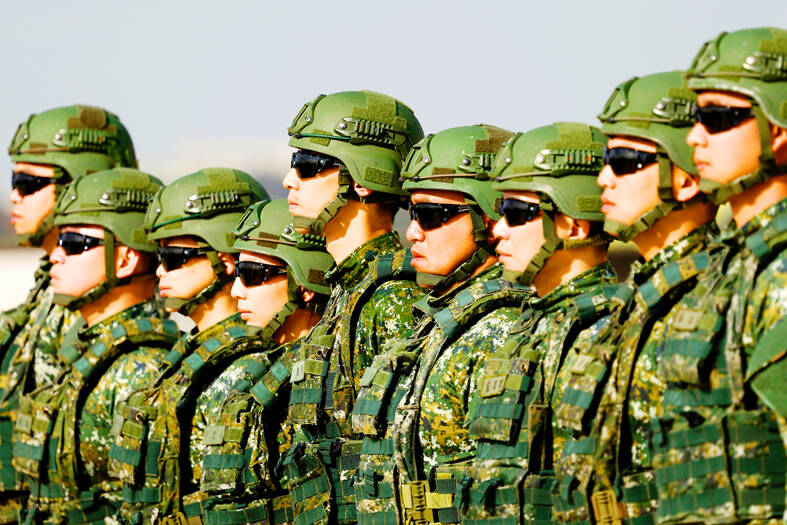A US-China expert last week urged Taiwan to increase military spending to at least match the US as a percentage of GDP, saying that it would be unrealistic to reach the White House’s 10 percent demand.
Oriana Skylar Mastro, a fellow at Stanford University’s Freeman Spogli Institute for International Studies, made the remarks during a US Senate Foreign Relations Committee hearing on Wednesday last week titled “Shared Threats: Indo-Pacific Alliances and Burden Sharing in Today’s Geopolitical Environment.”
Mastro called the situation in the Taiwan Strait unique compared with those of other US allies and partners in the Asia-Pacific region, as Taiwan is the only one facing the acute threat of war with China.

Photo: Ritchie B. Tongo, EPA-EFE
“If Taiwan expects the US to help in a conflict, thereby risking major war with China, Taiwan does need to contribute more to deterring the war, and prevailing if that proves necessary,” she said.
However, Taiwan spending 10 percent of its GDP on military spending, as suggested by US undersecretary of defense for policy nominee Elbridge Colby, is likely unrealistic, especially given that total government spending accounts for only 13.7 percent of GDP, but it must still increase military funding, Mastro said.
“As a symbolic gesture, Taiwan should spend at least the same amount as the United States on defense — currently 3.4 percent of GDP,” she said.
The money that Taiwan spends on defense should go toward buying “the right weapons,” focused on asymmetric warfare instead of traditional high-cost platforms such as submarines and F-35 jets, she said.
“Taiwan should persist in acquiring large quantities of anti-air, anti-armor and anti-ship missiles, weapons that provide more value in Taiwan’s defense scenario,” she said.
Raising spending is a “political need for Taipei to show seriousness about its defense if American lives are going to be sacrificed for its defense,” Mastro added.
The imbalance of power between Taiwan and China means that Taiwan’s ability to “hold off” long enough for US forces to arrive is “the heart of deterrence,” she said.
“Taipei will never be able to defend itself completely without US assistance,” she added.
The strategy should be for Taiwan to withstand 30 days of an invasion, while US forces arrive in the region, but the US should also take steps to convince Beijing that a quick military action has no way of succeeding, she said.
“There is no scenario in which Taiwan wins a war against China without direct US military intervention,” she added.
Within the next three to four years, the Chinese People’s Liberation Army is to tell Chinese President Xi Jinping (習近平) it is capable of taking Taiwan by force, Mastro said.
Additional reporting by CNA

Chinese spouse and influencer Guan Guan’s (關關) residency permit has been revoked for repeatedly posting pro-China videos that threaten national security, the National Immigration Agency confirmed today. Guan Guan has said many controversial statements in her videos posted to Douyin (抖音), including “the red flag will soon be painted all over Taiwan” and “Taiwan is an inseparable part of China,” and expressing hope for expedited reunification. The agency last year received multiple reports alleging that Guan Guan had advocated for armed reunification. After verifying the reports, the agency last month issued a notice requiring her to appear and explain her actions. Guan

GIVE AND TAKE: Blood demand continues to rise each year, while fewer young donors are available due to the nation’s falling birthrate, a doctor said Blood donors can redeem points earned from donations to obtain limited edition Formosan black bear travel mugs, the Kaohsiung Blood Center said yesterday, as it announced a goal of stocking 20,000 units of blood prior to the Lunar New Year. The last month of the lunar year is National Blood Donation Month, when local centers seek to stockpile blood for use during the Lunar New Year holiday. The blood demand in southern Taiwan — including Tainan and Kaohsiung, as well as Chiayi, Pingtung, Penghu and Taitung counties — is about 2,000 units per day, the center said. The donation campaign aims to boost

The Kaohsiung Tourism Bureau audited six hotels in an effort to prevent price gouging ahead of Korean band BTS’ concert tour in the city scheduled for Nov. 19, 21 and 22 this year. The bureau on Friday said that the audits — conducted in response to allegations of unfair pricing posted on social media — found no wrongdoing. These establishments included the local branches of Chateau de Chine, Hotel Nikko, My Humble House, and Grand Hai Lai, it said, adding that the Consumer Protection Commission would have penalized price gougers had the accusations been substantiated. The bureau said the Tourism Development Act

The military yesterday said it has located the flight data recorder, or black box, of an F-16V jet that disappeared off eastern Taiwan earlier this month, and it would soon deploy a salvage team to try to retrieve it. Air Force Command Headquarters said that while it had pinned down the location of the black box, it was still searching for the aircraft’s sole pilot, air force Captain Hsin Po-yi (辛柏毅). Without providing details, the air force said it had located the black box days after detecting some intermittent signals and would now engage a team of professionals to retrieve it. The air